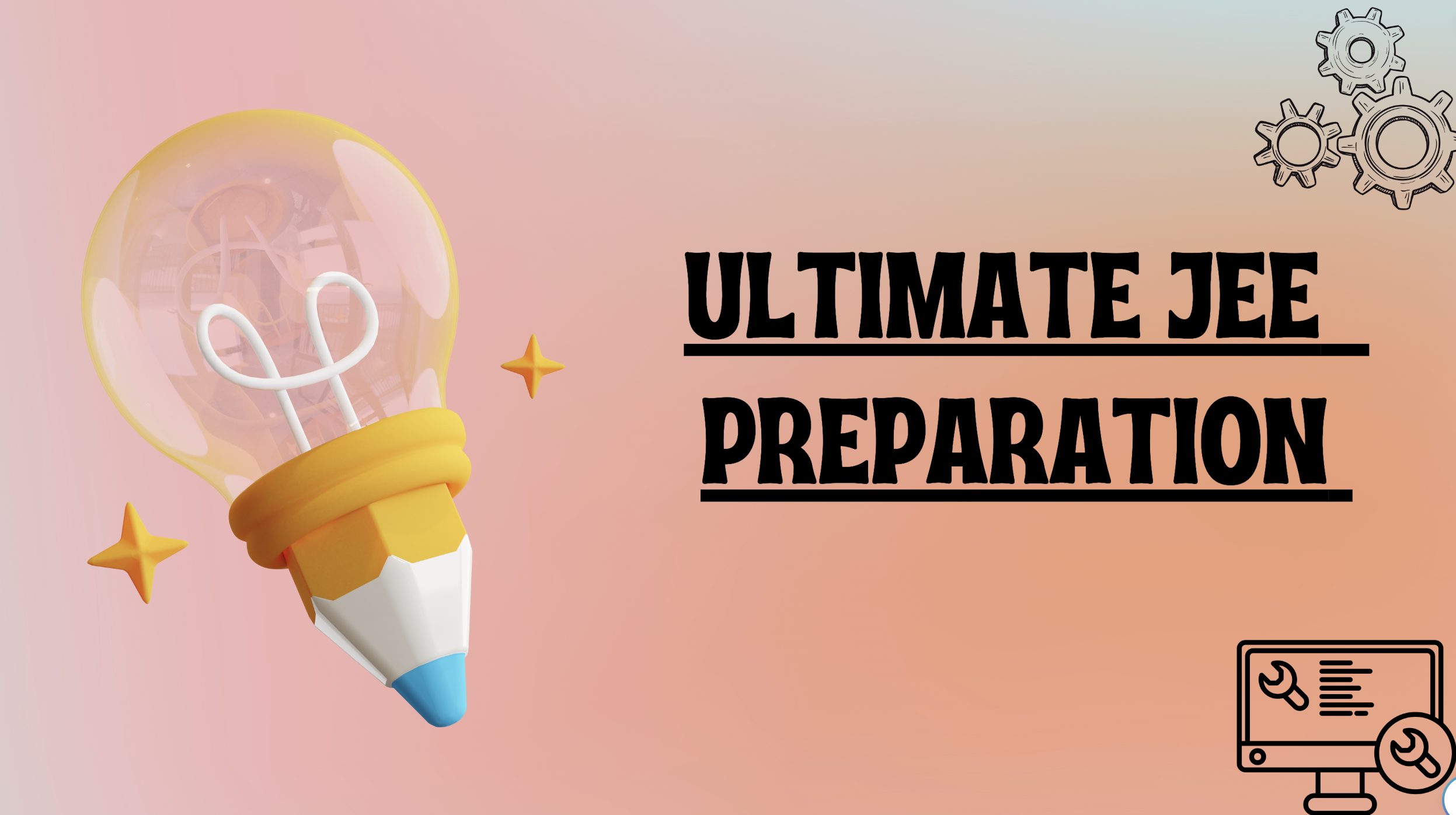
Ultimate JEE Maths Preparation Plan and Best Books
JEE Main Preparation Guide: Preparing for the Joint Entrance Examination (JEE) requires a well-structured study plan, especially when it comes to the Mathematics section. Mathematics is crucial for students preparing for the IIT JEE entrance exams. JEE Main serves as a gateway to various top engineering colleges across the country. Therefore, a strong foundation in mathematics is essential to excel in this exam. In this blog, we will provide you with an ultimate JEE Maths preparation plan and recommend some of the best books to help you achieve success.
IIT JEE Maths – Mode of Examination
JEE (Main) is conducted in the following modes:
a) Paper 1 (B.E. /B. Tech.) in “Computer Based Test (CBT)” mode only.
b) Paper 2A (B. Arch): Mathematics (Part-I) and Aptitude Test (Part-II) in “Computer Based Test (CBT)” mode only and Drawing Test (Part-III) in pen and paper (offline) mode, to be attempted on drawing sheet of A4 size.
c) Paper 2B (B. Planning): Mathematics (Part-I), Aptitude Test (Part-II), and Planning-Based Questions (Part-III) in Computer-Based Test (CBT) mode only.
IIT JEE Maths Preparation – Scheme of Examination
Subject combinations for each paper, type of questions in each paper, and mode of examination are given
in the table below:
| PAPER | SUBJECTS | TYPE OF QUESTIONS | MODE OF EXAMINATION |
| Paper 1: B.E./B.Tech. | Mathematics, Physics and Chemistry | Objective Type – Multiple Choice Questions (MCQs) and Questions for which the answer is a numerical value, with equal weightage to Mathematics, Physics, and Chemistry | “Computer-Based Test (CBT)” mode only |
JEE Main 2022 Maths Syllabus
The National Testing Agency (NTA) will release the IIT JEE Mathematics syllabus 2024 online on its official website jeemain.nta.nic.in. The syllabus outlines the important topics that will be included in the JEE examination.
Candidates preparing for the JEE 2024 should begin their preparation by downloading the official syllabus. Moreover, it is essential to understand the weightage assigned to each topic clearly. The following table provides a detailed breakdown of the JEE Maths syllabus:
| S.No. | Units | Topics |
| 1 | Sets, Relations and Functions | Sets, Relations, and Functions |
| 2 | Complex Numbers and Quadratic Equations | Complex numbers as ordered pairs of reals, Representation of complex numbers in the form a+ib and their representation in a plane, Argand diagram, algebra of complex numbers, modulus and argument (or amplitude) of a complex number, square root of a complex number, triangle inequality, Quadratic equations in real and complex number system and their solutions. Relation between roots and coefficients, nature of roots, formation of quadratic equations with given roots. |
| 3 | Matrices and Determinants | The fundamental principle of counting, permutation as an arrangement and combination as selection, Meaning of P (n,r) and C (n,r), simple applications. |
| 4 | Permutations And Combinations | Fundamental principle of counting, permutation as an arrangement and combination as selection, Meaning of P (n,r) and C (n,r), simple applications. |
| 5 | Mathematical Induction | Principle of Mathematical Induction and its simple applications. |
| 6 | Binomial Theorem and its Simple Applications | Binomial theorem for a positive integral index, general term, and middle term, properties of Binomial coefficients and simple applications. |
| 7 | Sequences and Series | Arithmetic and Geometric progressions, insertion of arithmetic, geometric means between two given numbers. Relation between A.M. and G.M. Sum up to n terms of special series: S n, S n2, Sn3. Arithmetico-Geometric progression. |
| 8 | Limit, Continuity and Differentiability | Real-valued functions, algebra of functions, polynomials, rational, trigonometric, logarithmic and exponential functions, inverse functions. Graphs of simple functions. Limits, continuity and differentiability. Differentiation of the sum, difference, product and quotient of two functions. Differentiation of trigonometric, inverse trigonometric, logarithmic, exponential, composite and implicit functions; derivatives of order up to two. Rolle’s and Lagrange’s Mean Value Theorems. Applications of derivatives: Rate of change of quantities, monotonic – increasing and decreasing functions, Maxima and minima of functions of one variable, tangents, and normals. |
| 9 | Integral Calculus | Integral as an anti-derivative. Fundamental integrals involving algebraic, trigonometric, exponential, and logarithmic functions. Integration by substitution, by parts, and by partial fractions. Integration using trigonometric identities. Integral as the limit of a sum. Fundamental Theorem of Calculus. Properties of definite integrals. Evaluation of definite integrals, determining areas of the regions bounded by simple curves in standard form. |
| 10 | Differential Equations | Ordinary differential equations, their order and degree. Formation of differential equations. Solution of differential equations by the method of separation of variables, solution of homogeneous and linear differential equations. |
| 11 | Co-ordinate Geometry | Cartesian system of rectangular co-ordinates 10 in a plane, distance formula, section formula, locus and its equation, translation of axes, slope of a line, parallel and perpendicular lines, intercepts of a line on the coordinate axes. Straight lines Various forms of equations of a line, intersection of lines, angles between two lines, conditions for concurrence of three lines, distance of a point from a line, equations of internal and external bisectors of angles between two lines, coordinates of centroid, orthocentre and circumcentre of a triangle, equation of family of lines passing through the point of intersection of two lines. Circles, conic sections Standard form of the equation of a circle, general form of the equation of a circle, its radius and centre, equation of a circle when the endpoints of a diameter are given, points of intersection of a line and a circle with the centre at the origin and condition for a line to be tangent to a circle, equation of the tangent. Sections of cones, equations of conic sections (parabola, ellipse and hyperbola) in standard forms, condition for y = mx + c to be a tangent and point (s) of tangency. |
| 12 | Three Dimensional Geometry | Coordinates of a point in space, distance between two points, section formula, direction ratios and direction cosines, angle between two intersecting lines. Skew lines, the shortest distance between them and its equation. Equations of a line and a plane in different forms, intersection of a line and a plane, and coplanar lines. |
| 13 | Vector Algebra | Vectors and scalars, addition of vectors, components of a vector in two dimensions and three-dimensional space, scalar and vector products, scalar and vector triple product. |
| 14 | Statistics and Probability | Measures of Dispersion: Calculation of mean, median, mode of grouped and ungrouped data calculation of standard deviation, variance, and mean deviation for grouped and ungrouped data. Probability: Probability of an event, addition, and multiplication theorems of probability, Baye’s theorem, probability distribution of a random variate, Bernoulli trials, and Binomial distribution. |
| 15 | Trigonometry | Trigonometrical identities and equations. Trigonometrical functions. Inverse trigonometrical functions and their properties. Heights and Distances |
| 16 | Mathematical Reasoning | Statements, logical operations and, or, implies, implied by, if, and only if. Understanding of tautology, contradiction, converse and contrapositive. |
JEE Maths Exam Pattern
Understanding the exam pattern is crucial for effective preparation. The Maths exam pattern varies slightly for JEE Mains and JEE Advanced. The following tables provide a detailed overview of the exam patterns for each:
JEE Mains Exam Pattern:
| Section | SECTION A | SECTION B | Total Marks |
|---|---|---|---|
| Mathematics | 20* | 10* | 100 |
Section B will contain Questions whose answers are to be filled in as a numerical value. In Section
B, candidates have to attempt any 05 (five) questions out of 10. There will be a negative marking for
both Section A and Section B. For each question in Section B, a candidate has to enter the correct
integer value of the answer using the mouse and the on-screen virtual numeric keypad in the place
designated to enter the answer. For Section B, the answer should be rounded off to the nearest
integer.
IIT JEE Math Marking Scheme for MCQs
| Correct Answer or the most appropriate Answer | Four marks (+4) |
| Incorrect Answer/Multiple Answer | Minus one mark (-1) |
| Unanswered /Marked for Review | No mark (0) |
Read | Career Opportunities: Why Engineering?
Important Tips For JEE Maths Preparation
Adopting certain strategies and practices to excel in the Mathematics section of the JEE is crucial. Here are some key points to consider:
- Understand the Syllabus: Begin by thoroughly familiarizing yourself with the JEE Maths syllabus. Take note of the topics covered and their respective weightage in the exam. This understanding will help you prioritize your study plan, focusing more on topics that carry greater importance in terms of mark allocation.
- Practice Regularly: Regular practice is the key to improving your problem-solving skills and enhancing your speed. Solve a wide range of mathematical problems, covering different topics and difficulty levels. This practice will reinforce your understanding of concepts and develop your ability to apply them effectively. Dedicate specific time slots for practice sessions in your study routine.
- Analyze Previous Years’ Papers: One of the most effective ways to prepare for the JEE Maths exam is by studying previous years’ question papers. Analyzing these papers will help you understand the exam pattern, become familiar with the types of questions asked, and identify recurring concepts. By practicing these papers, you will gain valuable insights into the exam’s expectations and be better prepared to tackle similar questions in the actual exam.
- Identify Strengths and Weaknesses: Regularly evaluate your performance and identify your strengths and weaknesses in different topics. This self-assessment will help you allocate your study time more efficiently. Focus on strengthening your weak areas by revisiting related concepts, practicing more problems, and seeking additional help if needed. Simultaneously, continue building upon your strengths to maintain a well-rounded preparation.
- Seek Clarification: If you encounter any doubts or difficulties while studying Mathematics for the JEE, seek clarification promptly. Consult your teachers, mentors, or peers to gain a better understanding of the concepts or problem-solving techniques. Additionally, you can make use of online forums or platforms where you can ask specific questions and receive guidance from subject matter experts.
- Time Management: Efficient time management is crucial during the exam. Practice solving problems within the allocated time limit to enhance your speed and accuracy. Develop strategies to optimize your time during the exam, such as quickly identifying solvable questions, attempting them first, and managing your time for lengthier or more complex problems.
Best Books for JEE Main Mathematics Preparation 2023
Following the right books is of utmost importance when it comes to preparing for the IIT JEE Maths. Firstly, the right books provide comprehensive coverage of the syllabus, ensuring that students don’t miss out on any important topics. Moreover, books are specifically designed to align with the JEE examination pattern, making them an ideal choice for aspirants.
The clarity and simplicity of language used in these books make complex concepts easier to understand, further aiding the learning process. Besides providing in-depth subject knowledge, the right books also serve as valuable reference materials.
| Chapter | Book Name |
|---|---|
| Class 11 and 12 | R D Sharma |
| Higher Algebra | Hall Knight and |
| Problems in Calculus of One Variable | I A Maron |
| Coordinate Geometry | S L Loney |
| Algebra | Arihant |
| Differential Calculus | Arihant |
| Integral Calculus | Arihant |
| Complete Mathematics for JEE Main | Tata McGrawHill |
| Trigonometry | Tata McGraw-Hill |
| New Pattern Mathematics for JEE Main/Advanced | Arihant |
Consult Doubtnut Maths Experts for JEE Main Preparation!
When it comes to preparing for the JEE, seeking personalized guidance can significantly enhance your chances of success. With Doubtnut, you can consult experienced math experts who specialize in JEE Main preparation. These experts offer comprehensive solutions to your math-related queries, ensuring you thoroughly understand the concepts and techniques required for the exam.

At Doubtnut, the math experts are well-versed in the intricacies of the JEE Main syllabus. They are equipped with in-depth knowledge and years of experience, making them adept at addressing various mathematical challenges that may arise during your preparation. Whether you’re struggling with a particular topic or seeking clarification on a complex concept, the math experts at Doubtnut are there to provide clear explanations and guide you toward a better understanding.
Furthermore, the teachers at Doubtnut go beyond simply providing solutions. They also offer valuable tips and strategies that can help you excel in the JEE Main examination. These tips are based on their extensive experience and understanding of the exam pattern, allowing them to offer insights into effective problem-solving techniques, time management, and overall exam strategy. Their guidance can prove invaluable in boosting your confidence and maximizing your performance on the day of the exam.



